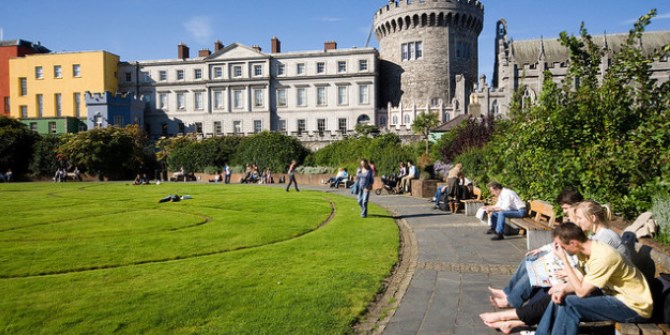 While a majority of Scots polled are against independence, opinion polls indicate that there is a pro-change electorate in Scotland. Peter Lynch argues that it is these voters who will play a decisive role regardless of what options are put to them.
While a majority of Scots polled are against independence, opinion polls indicate that there is a pro-change electorate in Scotland. Peter Lynch argues that it is these voters who will play a decisive role regardless of what options are put to them.
In May 2011, the seemingly impossible happened – the Scottish National Party won a majority in the Scottish election in May 2011: in spite of the electoral system. This result mattered because the party proposed that an independence referendum be held in autumn 2014 – meaning that the UK as we know it may have just over two years of life left in it. Though the idea of independence has been around for decades, it now seems a very immediate issue as Scotland is on fast forward hurtling towards the referendum.
Since January 2012, we have been in the ‘process’ stage of the debate over the referendum issue. The UK Government sought to seize the initiative by launching a consultation on the referendum on 10th January. The Scottish Government launched its own consultation on 12th January. Key questions to consider involved the correct legal authority to hold a referendum, the role of the Electoral Commission in overseeing the process, whether 16-17 year olds should be added to the electorate, the timing of the referendum and the thorny issue of how many questions should be asked?
Even though the exact details of the referendum have not been settled formally, there would seem to be an acceptance that the referendum will be held in the autumn of 2014 and overseen by the Electoral Commission and that the UK government will give the Scottish parliament the legal capacity to hold the referendum. Some of the other issues remain open though – especially whether to offer more than one ‘change’ option alongside independence come the referendum.
Even though the ‘process’ stage is not yet complete, we have just entered the ‘campaign’ stage of the referendum. Setting up cross-party groups early to develop cooperation and a unified campaign structure was one of the lessons from both devolution referendums in Scotland in 1979 and 1997 – and both sides have learned this lesson it would seem.
Yes to Independence launched on 25th May as a cross-party group of Nationalists, Greens and Socialists with support amongst the creative and business sectors. The No campaign has yet to launch in a formal way – despite cross-party talks held between Labour, Liberal Democrats and Conservatives to discuss cooperation as well as undertaking research on the language to use to promote the Union. However, UK institutions have not been quiet on the independence issue. Parliamentary committees in the House of Commons and the Lords have been mobilized to examine the independence issue and largely to defend the UK’s position and interests.
So far, much of the political and media discussion of the constitutional issue has viewed it as a binary choice between independence and the status quo. The reason for this is simply that the parties and governments – particularly on the Unionist side – have tended to frame the debate as if there are only two sides to the issue to suit their own party interests. But, of course, this is a false position – there are a number of potential constitutional destinations short of Scottish independence which voters find attractive.
Two things are striking here. First, a middle ‘change’ option is frequently the most popular one in opinion polls, ahead of independence and the current structure of devolution. When Yougov polled Scots on the three choices in February, 24 per cent chose independence, 36 per cent chose devo-max and 33 per cent picked the status quo. An earlier Yougov poll in January that offered a choice of devo-max or independence found that 58 per cent chose devo-max, whilst independence was supported by 39 per cent.
Second, the middle option has a number of variants but has been relatively under-articulated so far – it has support but no campaign attached to it. The SNP government offered independence but also devo-max in 2010 – devolving most policy and tax powers to Scotland but leaving the UK with macro-economic policy, defence and foreign affairs. In September 2011, Devo Plus emerged – an option advanced by think tank Reform Scotland along with politicians from the main opposition parties in Scotland. It proposed a mix of tax powers be shared between Scotland and the UK. More recently, Devo Left appeared, from members of the Labour and trade union movement. Civic Scotland is also working away on the constitutional issue with the Future of Scotland coalition.
Furthermore, both the UK and Scottish government consultations on the referendum had the effect of galvanising thinking around the middle option. Both Labour and the Liberal Democrats pledged to create commissions to examine greater devolved powers for Scotland – though what these will be and when they report is open to question. In any event, neither option is to be offered to Scottish voters at the referendum. Though, the SNP government could still add in a third constitutional option if it felt there was public support.
Despite this, the role of a middle option could be central to the referendum campaign and result. Polls certainly show that independence is a minority option in Scotland – meaning Yes campaigners have serious work to do converting voters from now until 2014. On the other hand, opinion polls indicate that there is a pro-change electorate in Scotland. They will likely play a decisive role at the referendum whether it offers a simple binary choice or a range of constitutional options – and is part of what makes the 2014 outcome unpredictable.
Note: This article gives the views of the author, and not the position of the British Politics and Policy blog, nor of the London School of Economics. Please read our comments policy before posting.
Peter Lynch received a Phd from LSE in 1994 and teaches Politics at the University of Stirling. He blogs on the referendum at http://scottishreferendumexperience.wordpress.com/ and is researching the 1979 and 1997 devolution referendums at www.scottishpoliticalarchive.org.uk <http://www.scottishpoliticalarchive.org.uk>






